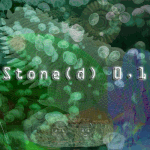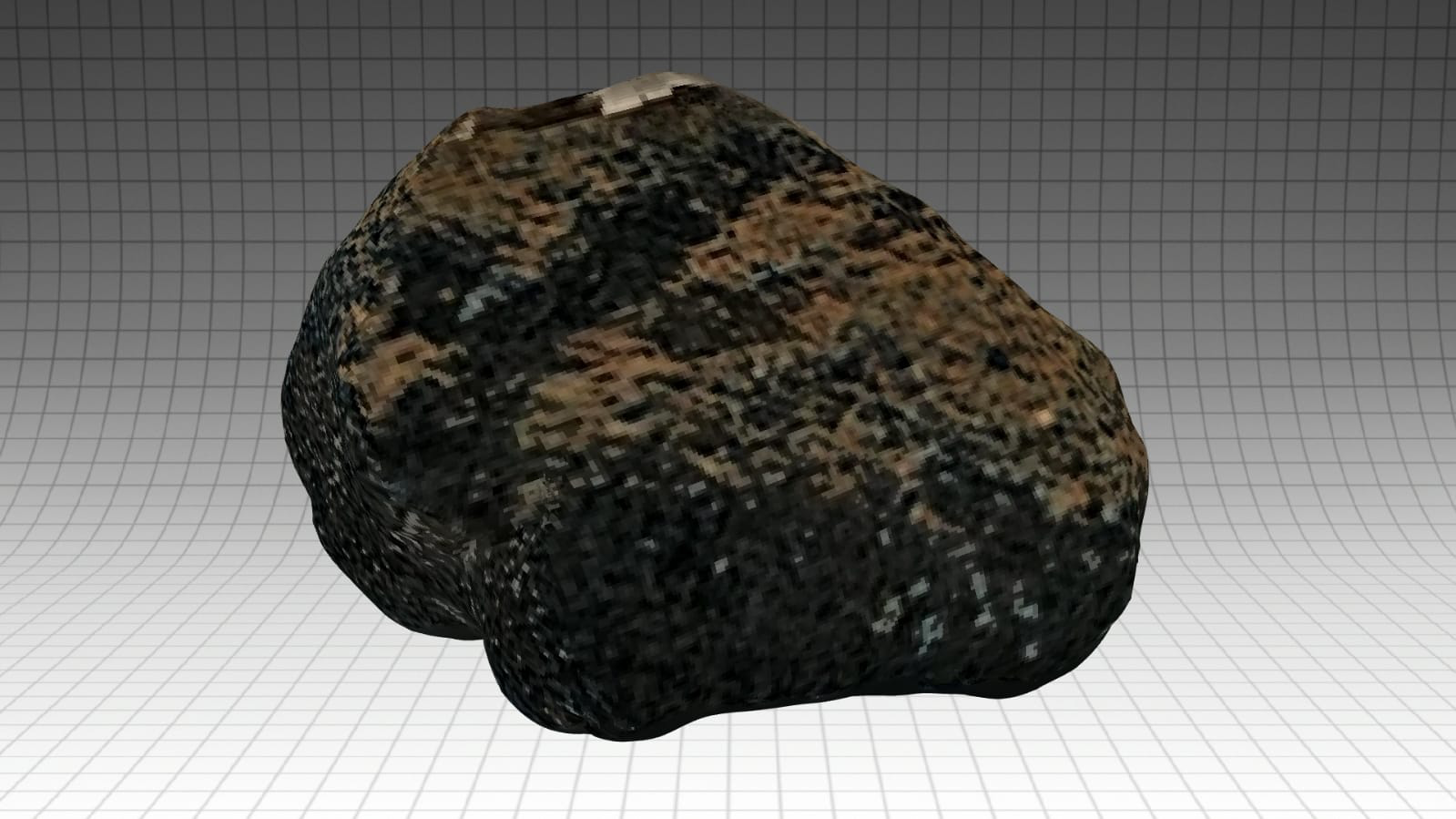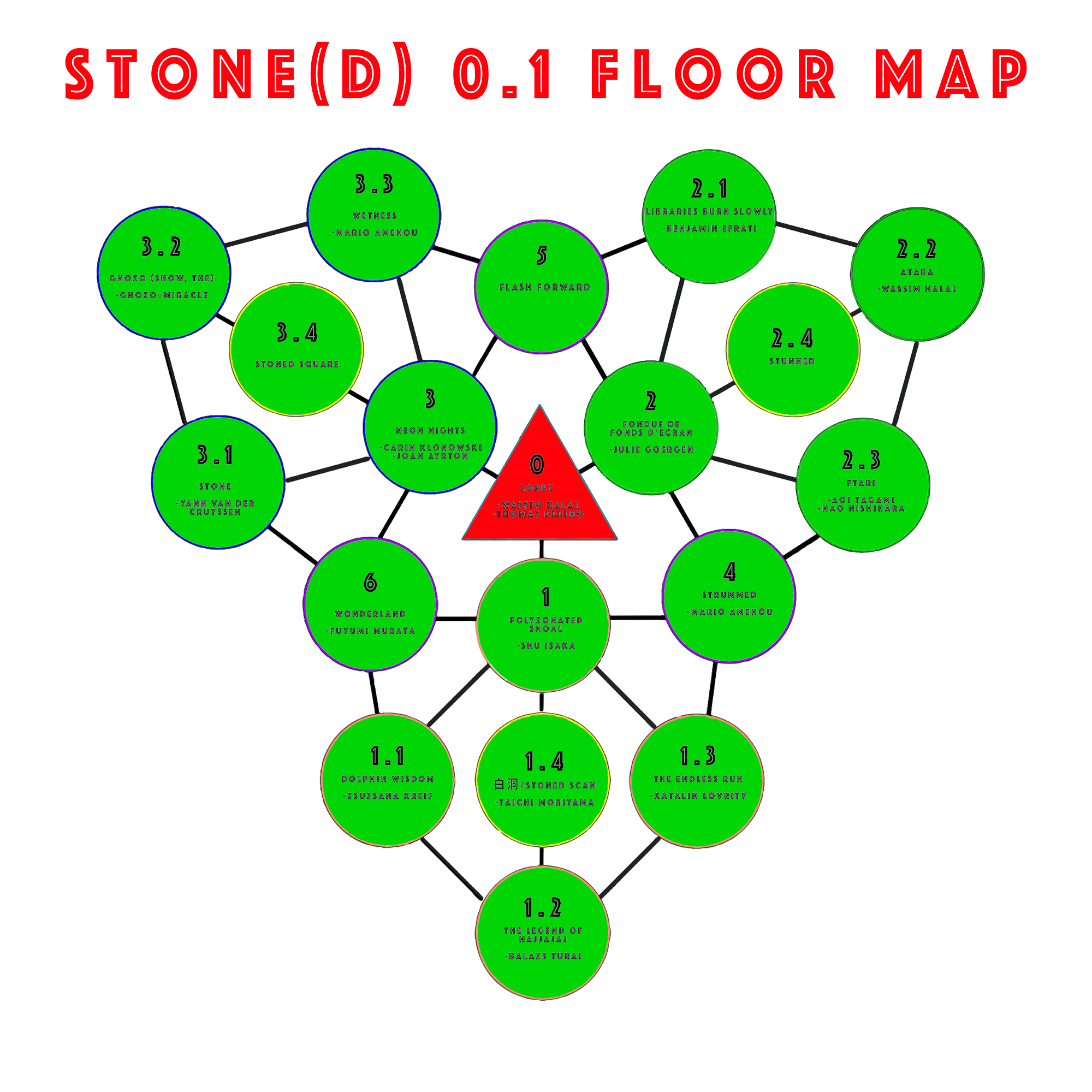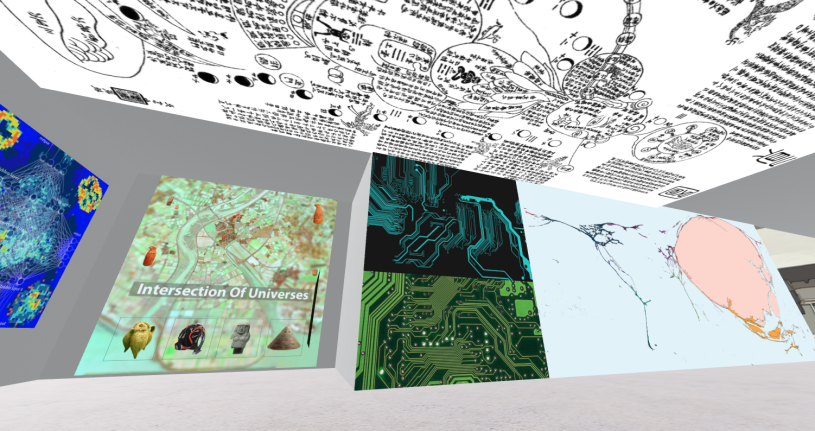Stone(d)
Stone(d)is an IRL/URL project by Metaleptic and Miracle about the multiple mysterious corellations between stones and stonedness.

Stoned is a pop-up online exhibition curated by Metaleptic and the Miracle Collective. The exhibitions Stoned 0.1 and Stoned 0.2 are hosted on Mozilla Hubs, and will be available until April 1st 2021.

Stoned is a conceptual framework to work on the intersection between mind and matter, rocks and psychic activity. Altered states of consciousness involve the human senses in different ways. For a time, the law of noncontradiction might cease to reign over liquids, air, solids and minds. Fossils and DNA both represent the same form of ancestry going back too far, much further than the type of relation we are intuitively able to understand. Stones are said to have psychic powers. Stones are revered as gods in certain areas of the world. Stoned, the kids in the dark of the park say they are, from friday evenings to sunday mornings. In this exhibition, stones are used as metaphors for ideas. Eerie visions, animated ideas and curious encounters bring together the works of all the participants who all share a certain fascination for stones, rocks, geology and archaeology, paleontology and prehistory.
Stoned 0.1 freely explores the idea that digital interfaces, and video games in particular, provide a special type of experience, which can be compared to hallucinatory perception. This type of experience is not explained by the description of the overconsumption of digital content in terms of addictology. If digital culture should be associated with drug culture, the best comparison is psychedelism. Hence, Stone(d) takes the visitor on an immersive mystical cruise from the internet to altered states of consciousnes through the evocative power of stones.

Stoned 0.2 is a side project by Benjamin Efrati and Shu Isaka; it is the first version of their project Intersection of the Universes, a in interactive exhibition and video-game about Cyber-Shamanism.

Metaleptic is a recursion-oriented MMO game engine and learning platform imagined by Benjamin Efrati in 2020. Hijacking the classic video game studio model, it is inspired by projects such as Processing, Garry’s Mod, Code.org, Minecraft and Manyland. Metaleptic enables the player to play and fork its original games via a gamified UI/UX, but goes further by enabling users to create projects from scratch using a web-based IDE and customizable visual tools . Designed to foster cooperative workflows, the platform connects games via different protocols such as combination, remixing and nesting. These principles aim at empowering users and fostering new gameplay patterns.
Stoned 0.1 Exhibiting artists:
Mario AMEHOU, Joan AYRTON, Benjamin EFRATI, GNoZo, Julie GOERGEN, Wassim HALAL, Shu ISAKA, Carin KLONOWSKI, Zsuzsana KREIF, Katalin LOVRITY, Taichi MORIYAMA, Fuyumi MURATA, Nao NISHIHARA, Thomas PERINO, Aoi TAGAMI, Balazs TURAI, Yann VAN DER CRUYSSEN

Stones, video games and altered states of consciousness: of psychedelic pragmaticism
“Stoned” is one way of describing the effect of heavy drug use (alcohol, cannabis, etc…) . Although it overlaps with the geologic notion of rock, the term “stone” can also refer to crystals and gems. Dealing with the relations between geology and altered states of perception, Stoned is a series of exhibitions in development.
In drug culture, “stoned” is used in contrast to “high”: The two terms seem to describe opposite polarities of the ways in which perception is altered. We argue here that such a distinction is superfluous, since nearly all mind-altering compounds enable human beings to reach out of the limitations of their consciousness. Mind-altering substances are not the only means of attaining radically different mental perspectives. Obviously, concentration, repetition, sensory deprivation, fasting and physical exercise are potent mind-opening processes. Yet, oftentimes mind-altering substances have been found useful in enabling individuals to break out of their daily psychological routine. From the most ancient ritual use of psychoactive compounds to the hallucinogenic function of video games from Moses’ drunkenness to the mind-numbing virtues of television and cinema, from Djalal Al Din Rûmi’s use of wine as metaphor of spiritual intoxication to archaïc meditation techniques, something rather important seems to take place when the mind is taken beyond its limits.
Stones are often described as small rocks. Rock, on the other hand, is made of stone and other mineral materials. Stones represent individuality at all scales: an individual being, an individual thought. By assembling stones one doesn’t create mere misshapen rocks, but rather complex sets of individual objects. This is the way imaginary hybrids and artworks are created. During temporary lapses of reason, the body and the mind can coexist in peace and output pure intuition. Stones are simple representations of complex thought processes.
Stoned 0.1 is the first in a series of exhibitions addressing the semantic intersection of the fields of geology and philosophy of perception. The project echoes the novel concept of Psychedelic Pragmatism, which aims at regrouping various artistic endeavours dealing with the complementarity of intuition and intellect, perception and ignorance, imagination and reality.
Psychedelic Pragmatism is a field of experience rather than a dogma. It reduces all pre-established differences between the many types of mind-altering substances. By focusing on representations inspired by the practical knowledge humans have been extracting from their use of psychoactive plants, fermented beverages and synthesized compounds, Stoned 0.1 offers a special type of exhibition concept. The visitor is invited to experience the art and interactions in a comfortable mindset. Mind-altering substances can virtually always benefit the user in reflecting upon the nature of the self and of reality, provided that the context of preparation and consumption are adequate.